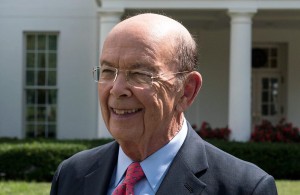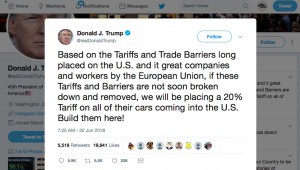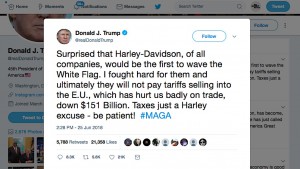
Commerce Secretary Wilbur Ross said the study determining if automotive imports could be declared a threat to national security.
(This story has been updated with additional information.)
The escalating tariff war between the United States and the European Union, heighted by a threat of a 20% tariff on EU-imported vehicles, could result in vehicle prices rising an average of $5,800 and eliminate hundreds of thousands of jobs.
Those are just some of the findings from study by the Peterson Institute for International Economics. The study claims that the cost to U.S. jobs from the import duties would be at least 195,000 jobs. It could be as high as 624,000 jobs if other countries retaliate.
Last week, Trump threatened to impose the 20% tariff and yesterday he said tariffs are coming soon.
“We are finishing our study of Tariffs on cars from the E.U. in that they have long taken advantage of the U.S. in the form of Trade Barriers and Tariffs. In the end it will all even out — and it won’t take very long!” Trump tweeted.
(Trump threatens Harley-Davidson with new “huge” tax. Click Here for the story.)

President Donald Trump issued another threat to place a tariff on EU-build vehicles coming into the U.S.
The Alliance of Automobile Manufacturers, which represents General Motors, Ford, Daimler, Toyota and others, are imploring Trump to not pursue this plan of attack, noting that if he continues it could ultimately cost consumers $45 billion annually.
“We believe the resulting impact of tariffs on imported vehicles and vehicle components will ultimately harm U.S. economic security and weaken our national security,” the group wrote, calling the tariffs a “mistake” and adding that imposing them “could very well set a dangerous precedent that other nations could use to protect their local market from foreign competition.”
The group representing major foreign automakers, including Toyota, Volkswagen, BMW and Hyundai, the Association of Global Automakers said the tariffs would harm automakers and U.S. consumers.
“The greatest threat to the U.S. automotive industry at this time is the possibility the administration will impose duties on imports in connection with this investigation,” the association said. “Such duties would raise prices for American consumers, limit their choices, and suppress sales and U.S. production of vehicles.”
The group added: “Rather than creating jobs, these tariffs would result in the loss of hundreds of thousands of American jobs producing and selling cars, SUVs, trucks and auto parts.”
The exact time when the administration may implement new tariffs depends on the conclusion of a report from the U.S. Department of Commerce. In May, the agency launched an investigation into whether imported vehicles pose a national security threat at Trump’s request.
U.S. Commerce Secretary Wilbur Ross said recently the department expects to have the report done by late July or August. The Commerce Department plans to hold two days of public comments in July on its investigation of auto imports. The department asked if it should consider U.S.-owned auto manufacturers differently than foreign automakers.
(Click Here to see how “nearly every segment of auto industry” is threatened by Trump trade tactics.)
The Association of Global Automakers rejected that contention, saying its members’ American workers “are no less patriotic or willing to serve their country in a time of crisis than any other Americans.”
The group questioned national security as grounds to restrict auto imports. The Alliance said “there is no basis to claim that auto-related imports are a threat to national security” and noted that 98% of U.S. auto imports came from U.S. national security allies.
The strong, anti-tariff position taken by the two groups comes as something of an unusual attack by auto industry leaders on proposed U.S. trade policies. It also comes as something of a reversal by Detroit-based automakers who have, over the years, demanded that Washington take steps to counteract what General Motors, Ford and the old Chrysler Corp. frequently derided as unfair trade policies – especially hefty tariffs – levied by foreign trade partners.
In the early 1980s, Detroit manufacturers lobbied Congress and the White House to take steps to reduce surging sales of Japanese auto imports, insisting there was a need for a “level playing field.” Japan headed off tariffs and other possible trade barriers by enacting a supposedly “voluntary” restraint agreement limiting exports to the U.S. But automotive analysts estimated the VRA agreement ultimately drove up new car prices by thousands of dollars.
Japanese automakers like Toyota, Nissan and Honda ultimately sidestepped the restrictions by building new assembly plants in the U.S., boosting product availability while eventually adding hundreds of thousands of jobs.
(To see more about Trump’s auto tariff threat triggering backlash, Click Here.)
The Trump Administration has said that it wants to expand domestic auto production with its proposed trade moves, but the general consensus is that a trade war would be far more likely to cut jobs while also raising prices, at least in the near-term.


How is my imported car possibly a national security threat?
If your (and 18 million other) imported car led to the elimination of all car manufacturing facilities in the USA (think TVs, microwave ovens, phones) then the USA would not have the manufacturing capability to respond to an international threat.
I just read The Arsenal of Democracy and it is clear that without the automotive manufacturing capability we had in the 40s everyone still alive would be speaking German (or Japanese).